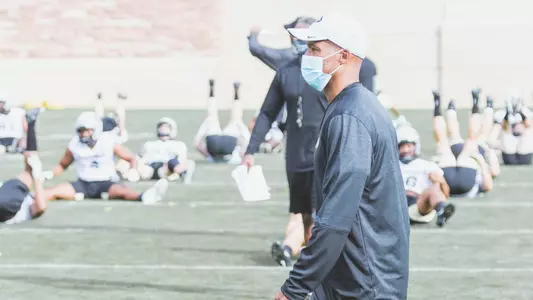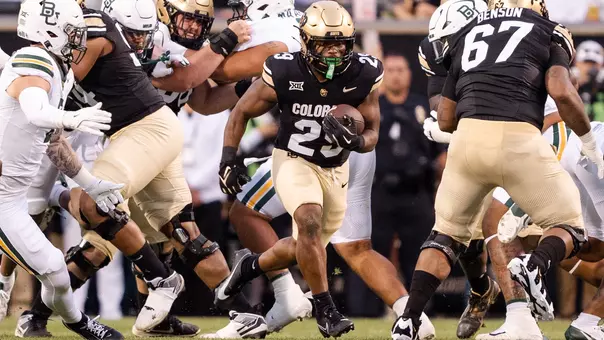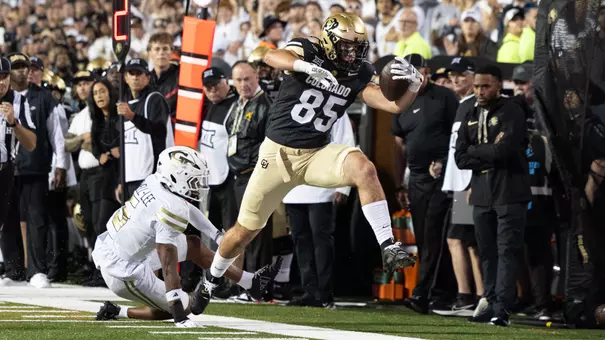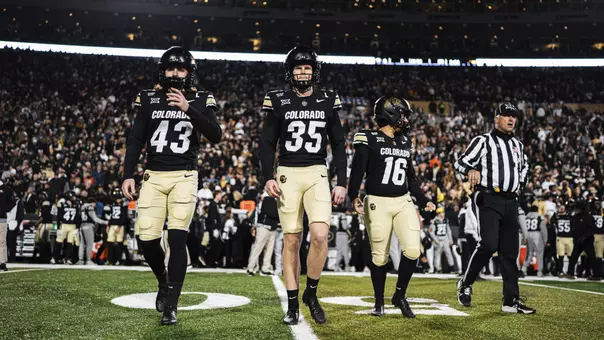Colorado University Athletics
Football
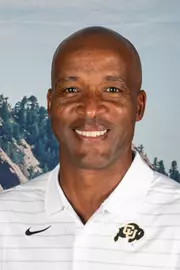
Karl Dorrell
- Title:
- Head Coach
- Email:
- emily.funke@colorado.edu
- Phone:
- 303-492-5330
Karl Dorrell is in his third year as the head football coach at the University of Colorado, as he was named the 27th full-timer to the position on February 23, 2020, very much a “homecoming” for him as he twice served as an assistant coach for the Buffaloes in the 1990s. He owns an 8-10 record in two seasons at the reins of the program.
Dorrell, 58, returned to CU from the National Football League’s Miami Dolphins, where he coached the receivers for the 2019 season; two days prior to accepting the Colorado position, he had been promoted to Miami’s assistant head coach by Dolphins head coach Brian Flores. He replaced Mel Tucker, who coached the Buffs for one season before accepting the head coach position at Michigan State 12 days before Dorrell was hired.
Dorrell led the Buffaloes to a 4-2 record in his first season, one of the most challenging in the history of college football due to the COVID-19 pandemic. In being rewarded with the Pac-12 Coach of the Year honor by both his peers in the conference and the Associated Press (media), the Football Writers Association of America (FWAA) selected him as their national “First Year” Coach of the Year, for those coaches in a first season at a school regardless if they had previously been a head coach previously. He was also one of nine finalists for the FWAA’s Eddie Robinson Coach of the Year honor.
Dorrell faced more challenges than most; first, after being hired in late February and approximately four weeks ahead of the scheduled start of spring practice, he had little time to assemble a staff and get to know them, meet with his players and plan ahead for team schemes. Then, three days before the start of spring drills (March 13), the pandemic shut down athletics across the country. It wouldn’t be until Oct. 9 for his first practice with the team, or 228 days since he was hired.
Many predicted the Buffs to finish fifth or sixth in the Pac-12 South Division, but CU would finish in second and were in contention for the league’s title game until the very end. He became the first first-year head coach to take over the Colorado program starting the year unranked and coaching the team into the national polls (No. 21, as well as No. 25 in the next-to-last CFP committee rankings), and was just the fifth to win his first four games. The last of 23 new head coaches in 2020 to lose a game, CU earned a bowl berth for the first time since 2016, making him just the third head coach in school history to lead the Buffs into a bowl in his first season. Injuries and COVID caught up to the Buffs, especially on defense, as Texas defeated an undermanned CU in the Alamo Bowl.
His second CU team finished 4-8, with a 3-6 mark in Pac-12 play to tie for fourth in the South Division. The league wins came over Oregon State (in an overtime thriller), Washington and Arizona, the latter a 34-0 verdict, CU’s first shutout of a conference opponent since 2005.
Prior to returning to CU, Dorrell was coaching his second time as a member of the Dolphins staff, as he returned as the team’s wide receivers coach on February 8, 2019. He previously served as the receivers coach from 2008-10 and was the quarterbacks coach in 2011, all four years under the late head coach at the time, Tony Sparano (who passed away in July 2018).
Bill McCartney hired him at Colorado as his wide receiver coach on February 20, 1992, Dorrell’s first full-time job on the Division I-A (now FBS) level. In his first year on the staff, two of his players, Charles Johnson and Michael Westbrook, became just the fourth pair of receivers on the same team at the time to each have over 1,000 receiving yards in NCAA history; the first two do so at Colorado, Johnson caught 57 passes for 1,149 yards and five touchdowns, while Westbrook pulled in 76 receptions for 1,060 yards and eight scores. Westbrook earned first-team All-America honors for that season, becoming just the third Buffalo wide receiver to do so, joining Cliff Branch (1971) and Dave Logan (1975). Johnson added another 1,000-yard season in 1993, again hauling in 57 balls for 1,082 yards and nine TDs, earning second-team All-American accolades, with Westbrook repeating as a first-team his senior year in 1994. (Westbrook will be inducted into the College Football Hall of Fame this December.)
The Buffs were 17-5-2 those two seasons, which included a win over Fresno State in the ’93 Aloha Bowl.
After leaving for the 1994 season to coach the receivers and serve as the passing game coordinator at Arizona State under coach Bruce Snyder, he would return to Boulder in 1995 as a member of Rick Neuheisel’s staff, reuniting with his quarterback from their playing days at UCLA. Neuheisel, on the legendary McCartney’s final staff in ’94, replaced him as CU’s head coach and brought back Dorrell to be CU’s offensive coordinator and receivers coach on January 12, 1995. He would add coaching the quarterbacks to his duties in 1998, the last season on the CU staff. CU’s offense under Dorrell’s direction proved electric, as the ’95 Buffaloes were eighth in the nation in scoring (36.9 points per game), sixth in total offense (486.6 yards per game, still the second most in a single season at Colorado) and eighth in passing offense (297.2 yards per game). CU was 33-14 in his second go-round on the staff, which included three bowl wins, two over Oregon in the 1996 Cotton and 1998 Aloha and over Washington in the 1996 Holiday.
It’s actually the fourth time he’s established roots in the state of Colorado. In addition to his two previous stints as an assistant coach for the Buffaloes, he was the receivers coach for the Denver Broncos for three years (2000-2002) under Mike Shanahan. Rod Smith’s first two career Pro Bowl selections coincided with Dorrell’s first two years with the team, and Smith surpassed the 1,000-yard receiving mark all three years under Dorrell’s tutelage. In Dorrell’s first season with the team in 2000, Smith and Ed McCaffrey combined for 201 receptions for 2,919 yards and 17 touchdowns.
He originally came to Colorado from Northern Arizona University, where he was the offensive coordinator and receivers coach in 1990 and 1991; in his last year there, NAU set school records for first downs (255) and total offense (4,539 yards). That followed his first full-time job as receivers coach at the University of Central Florida in 1989, that on the heels of his first taste in coaching as a graduate assistant at his alma mater, UCLA in 1988.
The Dolphins finished with a 5-11 record in 2019 after starting 0-7, showing dramatic improvement over the second half of the season. Miami averaged 276 passing yards per game during that stretch, with the season ending with a dramatic 27-24 win at New England which cost the Patriots a first round bye. Under Dorrell’s tutoring, DeVante Parker led the team in receiving with 72 catches for 1,202 yards and nine touchdowns, with 48 for 859 yards and six scores the final nine games of the year.
Prior to his second stint with Miami, Dorrell spent four seasons (2015-18) with the New York Jets as their wide receivers coach. During that span, the Jets had five different players record at least 50 receptions in an individual season while often enduring coaching a unit ravaged with injuries. Two of his receivers were former Denver Broncos in Brandon Marshall (who he previously coached at Miami) and Eric Decker. In Dorrell’s first season with the Jets in 2015, he helped Marshall set franchise records for receptions (109), receiving yards (1,502) and receiving touchdowns (14). All three marks ranked in the top five in the NFL that season, while Decker caught 80 passes for 1,027 yards and 12 touchdowns. The pair combined for the most receptions (189) and receiving touchdowns (26) by any wide receiver duo in team history, while setting an NFL record by scoring touchdowns in the same game on nine occasions.
He had returned to the NFL after one season (2014) at Vanderbilt University, where he was the offensive coordinator and quarterbacks coach under first-year head coach Derek Mason.
He was the quarterbacks coach for the Houston Texans in 2012 and 2013, where he worked with Matt Schaub and Case Keenum. Schaub passed for 4,008 yards and 22 touchdowns in 2012, leading the Texans to a 12-4 record, the AFC South Division title and a wild card playoff victory over Cincinnati before falling to New England in the divisional round.
After five years as head coach of UCLA, Dorrell went back to the NFL, where he served as Miami’s wide receivers coach (2008-10) and then its quarterbacks coach (2011). In his last year there, the Dolphins lost quarterback Chad Henne to a season-ending injury in the fourth game; Dorrell helped Matt Moore step in and pass for 2,497 yards and 16 touchdowns, with an 87.1 quarterback rating for his 12 starts. In 2010, Dorrell tutored Marshall and Davone Bess to form one of the top pass-catching combinations in the NFL, as the two would combine for 165 receptions for 1,834 yards and eight touchdowns (the receptions were the most by a Dolphins duo in team history). In his first season in 2008, Miami won 10 games more than the previous season, posting an 11-5 mark and winning the AFC East, as three of Dorrell’s receivers – Bess, Ted Ginn Jr. and Greg Camarillo – all had over 50 receptions and 500 yards (165 catches for 1,957 yards and 10 touchdowns combined).
In 2003, Dorrell was named head coach at his alma mater, UCLA. During his time heading up the Bruins’ program, the school posted a 35-27 record (24-18 in Pacific 10 Conference games) and earned a bowl berth all five seasons. His first team finished 6-7 and his second 6-6, with both suffering defeats in their bowl games. In his third season in 2005, UCLA went 10-2, recorded a victory over Northwestern in the Sun Bowl and finished with a No. 13 national ranking in the USA Today Coaches poll (No. 16 by the Associated Press). For the team’s performance that year, Dorrell was named the Pac-10 Conference co-Coach of the Year. In 2006, his Bruins upset cross-town rival and second-ranked USC, 13-9, knocking the Trojans out of a second straight BCS Championship game. That team finished the year with a 7-6 mark, and his final squad there was 6-6 before he was dismissed as head coach prior to the Bruins’ Las Vegas bowl date against BYU.
Dorrell’s first game as a college head coach was actually in Boulder, as UCLA opened the 2003 season in week two after CU defeated CSU opening week. The Buffs rallied late to spoil his debut, with Joel Klatt (now of FOX Sports) throwing a 6-yard touchdown pass to Joe Klopfenstein with 2:15 to play to give CU a 16-14 victory.
He twice worked with the Denver Broncos’ staff during training camp in both 1993 and 1999 as part of the NFL’s Minority Coaching Fellowship program, first under Wade Phillips and then under Shanahan, who would give him his first full-time position in the professional ranks the following spring.
Dorrell is not the first to be hired as the head coach at Colorado who previously was an assistant coach at the school; in fact, he is the fifth. He joins an impressive list of those who spent time in Boulder as an assistant before being named head coach: Frank Potts (assistant for the 1927-39, 1941-43 and 1946-47 seasons), Rick Neuheisel (1994), Gary Barnett (1984-91) and Jon Embree (1993-2002). Dorrell joined the Buffs the season after Barnett was named head coach at Northwestern, and Neuheisel actually had replaced Dorrell on the Colorado staff under Bill McCartney.
He also became the third CU coach to take over the program after signing day: Chuck Fairbanks arrived in Boulder on April 4, 1979 after a lengthy court battle with the New England Patriots to release him from their contract, and McCartney was hired on June 9, 1982 after Fairbanks left to coach New Jersey in the fledgling United States Football League (USFL).
As a student-athlete at UCLA, he lettered four times at wide receiver under coach Terry Donahue from 1982-86. He caught 108 passes for 1,517 yards and nine touchdowns, and at the time of his graduation, he was second in receptions and fourth in receiving yards on the Bruins’ all-time charts. He played on five UCLA bowl champion teams, the 1983 Rose (def. Michigan), 1984 Rose (def. Illinois), 1985 Fiesta (def. Miami-Fla. the year he redshirted), 1986 Rose (def. Iowa) and the 1986 Freedom (def. BYU); in three of those games, he combined to have 14 receptions for 203 yards and three touchdowns. During his career, the Bruins had a record of 43-13-4 and won three Pac-10 titles.
He graduated from UCLA in 1986 with a degree in Psychology while earning a minor in Business Administration. He signed as a free agent with the Dallas Cowboys and played half of the 1987 season before he was placed on injured reserve.
Dorrell was born on December 18, 1963 in Alameda, Calif., and graduated from Helix Charter High School in La Mesa, Calif. (a San Diego suburb), where in football he was a two-time all-league performer and an honorable mention All-American as a senior and also lettered in basketball, baseball and track. He is married to the former Kim Westley, and the couple has two grown children, son Chandler, who was a receiver at both Stanford and Vanderbilt and is CU’s assistant director of player personnel, and daughter Lauren, who lettered three times on CU’s volleyball team from 2016-18.
Dorrell, 58, returned to CU from the National Football League’s Miami Dolphins, where he coached the receivers for the 2019 season; two days prior to accepting the Colorado position, he had been promoted to Miami’s assistant head coach by Dolphins head coach Brian Flores. He replaced Mel Tucker, who coached the Buffs for one season before accepting the head coach position at Michigan State 12 days before Dorrell was hired.
Dorrell led the Buffaloes to a 4-2 record in his first season, one of the most challenging in the history of college football due to the COVID-19 pandemic. In being rewarded with the Pac-12 Coach of the Year honor by both his peers in the conference and the Associated Press (media), the Football Writers Association of America (FWAA) selected him as their national “First Year” Coach of the Year, for those coaches in a first season at a school regardless if they had previously been a head coach previously. He was also one of nine finalists for the FWAA’s Eddie Robinson Coach of the Year honor.
Dorrell faced more challenges than most; first, after being hired in late February and approximately four weeks ahead of the scheduled start of spring practice, he had little time to assemble a staff and get to know them, meet with his players and plan ahead for team schemes. Then, three days before the start of spring drills (March 13), the pandemic shut down athletics across the country. It wouldn’t be until Oct. 9 for his first practice with the team, or 228 days since he was hired.
Many predicted the Buffs to finish fifth or sixth in the Pac-12 South Division, but CU would finish in second and were in contention for the league’s title game until the very end. He became the first first-year head coach to take over the Colorado program starting the year unranked and coaching the team into the national polls (No. 21, as well as No. 25 in the next-to-last CFP committee rankings), and was just the fifth to win his first four games. The last of 23 new head coaches in 2020 to lose a game, CU earned a bowl berth for the first time since 2016, making him just the third head coach in school history to lead the Buffs into a bowl in his first season. Injuries and COVID caught up to the Buffs, especially on defense, as Texas defeated an undermanned CU in the Alamo Bowl.
His second CU team finished 4-8, with a 3-6 mark in Pac-12 play to tie for fourth in the South Division. The league wins came over Oregon State (in an overtime thriller), Washington and Arizona, the latter a 34-0 verdict, CU’s first shutout of a conference opponent since 2005.
Prior to returning to CU, Dorrell was coaching his second time as a member of the Dolphins staff, as he returned as the team’s wide receivers coach on February 8, 2019. He previously served as the receivers coach from 2008-10 and was the quarterbacks coach in 2011, all four years under the late head coach at the time, Tony Sparano (who passed away in July 2018).
Bill McCartney hired him at Colorado as his wide receiver coach on February 20, 1992, Dorrell’s first full-time job on the Division I-A (now FBS) level. In his first year on the staff, two of his players, Charles Johnson and Michael Westbrook, became just the fourth pair of receivers on the same team at the time to each have over 1,000 receiving yards in NCAA history; the first two do so at Colorado, Johnson caught 57 passes for 1,149 yards and five touchdowns, while Westbrook pulled in 76 receptions for 1,060 yards and eight scores. Westbrook earned first-team All-America honors for that season, becoming just the third Buffalo wide receiver to do so, joining Cliff Branch (1971) and Dave Logan (1975). Johnson added another 1,000-yard season in 1993, again hauling in 57 balls for 1,082 yards and nine TDs, earning second-team All-American accolades, with Westbrook repeating as a first-team his senior year in 1994. (Westbrook will be inducted into the College Football Hall of Fame this December.)
The Buffs were 17-5-2 those two seasons, which included a win over Fresno State in the ’93 Aloha Bowl.
After leaving for the 1994 season to coach the receivers and serve as the passing game coordinator at Arizona State under coach Bruce Snyder, he would return to Boulder in 1995 as a member of Rick Neuheisel’s staff, reuniting with his quarterback from their playing days at UCLA. Neuheisel, on the legendary McCartney’s final staff in ’94, replaced him as CU’s head coach and brought back Dorrell to be CU’s offensive coordinator and receivers coach on January 12, 1995. He would add coaching the quarterbacks to his duties in 1998, the last season on the CU staff. CU’s offense under Dorrell’s direction proved electric, as the ’95 Buffaloes were eighth in the nation in scoring (36.9 points per game), sixth in total offense (486.6 yards per game, still the second most in a single season at Colorado) and eighth in passing offense (297.2 yards per game). CU was 33-14 in his second go-round on the staff, which included three bowl wins, two over Oregon in the 1996 Cotton and 1998 Aloha and over Washington in the 1996 Holiday.
It’s actually the fourth time he’s established roots in the state of Colorado. In addition to his two previous stints as an assistant coach for the Buffaloes, he was the receivers coach for the Denver Broncos for three years (2000-2002) under Mike Shanahan. Rod Smith’s first two career Pro Bowl selections coincided with Dorrell’s first two years with the team, and Smith surpassed the 1,000-yard receiving mark all three years under Dorrell’s tutelage. In Dorrell’s first season with the team in 2000, Smith and Ed McCaffrey combined for 201 receptions for 2,919 yards and 17 touchdowns.
He originally came to Colorado from Northern Arizona University, where he was the offensive coordinator and receivers coach in 1990 and 1991; in his last year there, NAU set school records for first downs (255) and total offense (4,539 yards). That followed his first full-time job as receivers coach at the University of Central Florida in 1989, that on the heels of his first taste in coaching as a graduate assistant at his alma mater, UCLA in 1988.
The Dolphins finished with a 5-11 record in 2019 after starting 0-7, showing dramatic improvement over the second half of the season. Miami averaged 276 passing yards per game during that stretch, with the season ending with a dramatic 27-24 win at New England which cost the Patriots a first round bye. Under Dorrell’s tutoring, DeVante Parker led the team in receiving with 72 catches for 1,202 yards and nine touchdowns, with 48 for 859 yards and six scores the final nine games of the year.
Prior to his second stint with Miami, Dorrell spent four seasons (2015-18) with the New York Jets as their wide receivers coach. During that span, the Jets had five different players record at least 50 receptions in an individual season while often enduring coaching a unit ravaged with injuries. Two of his receivers were former Denver Broncos in Brandon Marshall (who he previously coached at Miami) and Eric Decker. In Dorrell’s first season with the Jets in 2015, he helped Marshall set franchise records for receptions (109), receiving yards (1,502) and receiving touchdowns (14). All three marks ranked in the top five in the NFL that season, while Decker caught 80 passes for 1,027 yards and 12 touchdowns. The pair combined for the most receptions (189) and receiving touchdowns (26) by any wide receiver duo in team history, while setting an NFL record by scoring touchdowns in the same game on nine occasions.
He had returned to the NFL after one season (2014) at Vanderbilt University, where he was the offensive coordinator and quarterbacks coach under first-year head coach Derek Mason.
He was the quarterbacks coach for the Houston Texans in 2012 and 2013, where he worked with Matt Schaub and Case Keenum. Schaub passed for 4,008 yards and 22 touchdowns in 2012, leading the Texans to a 12-4 record, the AFC South Division title and a wild card playoff victory over Cincinnati before falling to New England in the divisional round.
After five years as head coach of UCLA, Dorrell went back to the NFL, where he served as Miami’s wide receivers coach (2008-10) and then its quarterbacks coach (2011). In his last year there, the Dolphins lost quarterback Chad Henne to a season-ending injury in the fourth game; Dorrell helped Matt Moore step in and pass for 2,497 yards and 16 touchdowns, with an 87.1 quarterback rating for his 12 starts. In 2010, Dorrell tutored Marshall and Davone Bess to form one of the top pass-catching combinations in the NFL, as the two would combine for 165 receptions for 1,834 yards and eight touchdowns (the receptions were the most by a Dolphins duo in team history). In his first season in 2008, Miami won 10 games more than the previous season, posting an 11-5 mark and winning the AFC East, as three of Dorrell’s receivers – Bess, Ted Ginn Jr. and Greg Camarillo – all had over 50 receptions and 500 yards (165 catches for 1,957 yards and 10 touchdowns combined).
In 2003, Dorrell was named head coach at his alma mater, UCLA. During his time heading up the Bruins’ program, the school posted a 35-27 record (24-18 in Pacific 10 Conference games) and earned a bowl berth all five seasons. His first team finished 6-7 and his second 6-6, with both suffering defeats in their bowl games. In his third season in 2005, UCLA went 10-2, recorded a victory over Northwestern in the Sun Bowl and finished with a No. 13 national ranking in the USA Today Coaches poll (No. 16 by the Associated Press). For the team’s performance that year, Dorrell was named the Pac-10 Conference co-Coach of the Year. In 2006, his Bruins upset cross-town rival and second-ranked USC, 13-9, knocking the Trojans out of a second straight BCS Championship game. That team finished the year with a 7-6 mark, and his final squad there was 6-6 before he was dismissed as head coach prior to the Bruins’ Las Vegas bowl date against BYU.
Dorrell’s first game as a college head coach was actually in Boulder, as UCLA opened the 2003 season in week two after CU defeated CSU opening week. The Buffs rallied late to spoil his debut, with Joel Klatt (now of FOX Sports) throwing a 6-yard touchdown pass to Joe Klopfenstein with 2:15 to play to give CU a 16-14 victory.
He twice worked with the Denver Broncos’ staff during training camp in both 1993 and 1999 as part of the NFL’s Minority Coaching Fellowship program, first under Wade Phillips and then under Shanahan, who would give him his first full-time position in the professional ranks the following spring.
Dorrell is not the first to be hired as the head coach at Colorado who previously was an assistant coach at the school; in fact, he is the fifth. He joins an impressive list of those who spent time in Boulder as an assistant before being named head coach: Frank Potts (assistant for the 1927-39, 1941-43 and 1946-47 seasons), Rick Neuheisel (1994), Gary Barnett (1984-91) and Jon Embree (1993-2002). Dorrell joined the Buffs the season after Barnett was named head coach at Northwestern, and Neuheisel actually had replaced Dorrell on the Colorado staff under Bill McCartney.
He also became the third CU coach to take over the program after signing day: Chuck Fairbanks arrived in Boulder on April 4, 1979 after a lengthy court battle with the New England Patriots to release him from their contract, and McCartney was hired on June 9, 1982 after Fairbanks left to coach New Jersey in the fledgling United States Football League (USFL).
As a student-athlete at UCLA, he lettered four times at wide receiver under coach Terry Donahue from 1982-86. He caught 108 passes for 1,517 yards and nine touchdowns, and at the time of his graduation, he was second in receptions and fourth in receiving yards on the Bruins’ all-time charts. He played on five UCLA bowl champion teams, the 1983 Rose (def. Michigan), 1984 Rose (def. Illinois), 1985 Fiesta (def. Miami-Fla. the year he redshirted), 1986 Rose (def. Iowa) and the 1986 Freedom (def. BYU); in three of those games, he combined to have 14 receptions for 203 yards and three touchdowns. During his career, the Bruins had a record of 43-13-4 and won three Pac-10 titles.
He graduated from UCLA in 1986 with a degree in Psychology while earning a minor in Business Administration. He signed as a free agent with the Dallas Cowboys and played half of the 1987 season before he was placed on injured reserve.
Dorrell was born on December 18, 1963 in Alameda, Calif., and graduated from Helix Charter High School in La Mesa, Calif. (a San Diego suburb), where in football he was a two-time all-league performer and an honorable mention All-American as a senior and also lettered in basketball, baseball and track. He is married to the former Kim Westley, and the couple has two grown children, son Chandler, who was a receiver at both Stanford and Vanderbilt and is CU’s assistant director of player personnel, and daughter Lauren, who lettered three times on CU’s volleyball team from 2016-18.
AT-A-GLANCE—As a full-time coach, he has coached in 446 career games: in Division I-A (FBS) 186 games, with his teams owning a record of 106-78-2 which includes nine bowl games (1993 Fiesta, 1993 Aloha, 1996 Cotton, 1999 Holiday, 2003 Silicon Valley, 2004 Las Vegas, 2005 Sun, 2006 Emerald, 2020 Alamo). In his two previous stints at Colorado, the Buffaloes were 50-19-2. He coached in 22 games in Division I-AA (now FCS), 10 games in Division II, and in the National Football League, he coached in 224 regular season games (80 with Miami, 64 with the New York Jets, 48 with Denver and 32 with Houston) as well as in four NFL playoff games (2 with Houston, 1 each with Denver and Miami).

Coaching Experience
| Seasons | Team | Position |
|---|---|---|
| 1988 | UCLA | Graduate Assistant (Offense) |
| 1989 | Central Florida | Wide Receivers |
| 1990-91 | Northern Arizona | Offensive Coordinator/Wide Receivers |
| 1992-93 | Colorado | Wide Receivers |
| 1994 | Arizona State | Passing Game Coordinator/Wide Receivers |
| 1995-97 | Colorado | Offensive Coordinator/Wide Receivers |
| 1998 | Colorado | Offensive Coordinator/Quarterbacks/Wide Receivers |
| 1999 | Washington | Offensive Coordinator/Wide Receivers |
| 2000-02 | Denver Broncos | Wide Receivers |
| 2003-07 | UCLA | Head Coach |
| 2008-10 | Miami Dolphins | Wide Receivers |
| 2011 | Miami Dolphins | Quarterbacks |
| 2012-13 | Houston Texans | Quarterbacks |
| 2014 | Vanderbilt | Offensive Coordinator/Quarterbacks |
| 2015-18 | New York Jets | Wide Receivers |
| 2015-18 | New York Jets | Wide Receivers |
| 2019 | Miami Dolphins | Wide Receivers |
| 2020 | Miami Dolphins | Assistant Head Coach/Wide Receivers |
| 2020- | Colorado | Head Coach |


